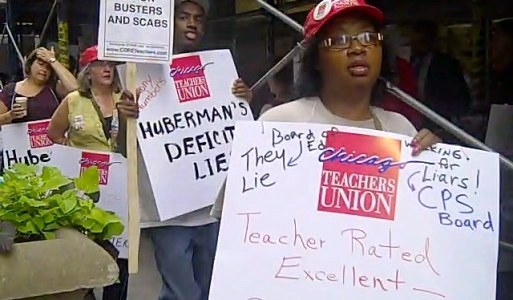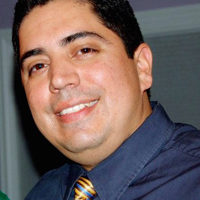
CHICAGO – Nearly a hundred teachers, parents, students, labor leaders and community activists rallied at the Chicago Board of Education building here July 28 against recent massive teacher layoffs.
Last week Chicago Public Schools sent out 600 layoff notices to 400 teachers and 200 staff at elementary schools. Last month, 239 teachers who were not assigned to a specific school were also laid off.
In all, up to 1,500 Chicago teachers may lose their jobs before the school year begins.
The Chicago Teachers Union said the cuts are unacceptable and are demanding their members be hired back.
“Educators who work on the front lines are not willing to accept these measures,” said CTU Vice President Jesse Sharkey. “We’re going to speak out and defend public education and we don’t buy the argument that our society is too poor to afford good schools. This is everybody’s struggle now.”
The cuts are part of the school district’s effort to address a $370 million budget shortfall. High school classes are being increased from 28 to 33 students, and programs including world languages, bilingual education, gifted and after school programs are on the chopping block.
Gertrude Williams said she is one of the teachers who were recently laid off.
“We’re concerned about our schools and teachers are bitter,” she said. “Some have over 20 years on the job and now fired.”
Williams said she has a message for Mayor Richard Daley and the Board of Education.
“You set these policies and we followed your rules. And this is how you reward us?”
Mary Maloney said she, too, recently got the pink slip and has been a teacher for 20 years.
“It’s not really about the money, it’s about power,” said Maloney. “They’re trying to pressure the CTU to avoid a four percent raise in our contract. It’s about union busting and privatizing our schools.”
Maloney notes most teachers are underpaid and overworked. “In the summer most of us have to get jobs just to make ends meet,” she said.
Others said teachers are so discouraged they some want to leave the profession altogether.
Schools chief Ron Huberman has blamed the union for a portion of the cuts, saying $135 million could be saved if they agreed to relinquish promised four percent pay raises.
However, CTU officials claim teachers have already made concessions, including hits to their pensions.
Community groups, along with the union, continue to demand schools be reimbursed by tax dollars that have been diverted by TIFs (tax increment financing zones). TIFs are part of a controversial, so-called urban renewal program, wherein the property taxes that go to schools and parks are frozen and any increases over the next 23 years are funneled to private development.
Critics note in Chicago, most of the city, including wealthy downtown neighborhoods, is covered by TIFs, which are supposed to be a tool used only in “blighted” areas.
The CTU contends as much as half a billion a year that should have gone in part to schools was diverted by TIFs. Community leaders say the money often ends up in the hands of politically connected developers and other private for-profit projects.
Jorge Ramirez, leader with the Chicago Federation of Labor was at the rally to support the teachers.
“Cost savings is not a good approach to collective bargaining and what is needed is an open and constructive dialogue that’s transparent to foster good participation on both sides,” he said. “And the leadership of the CTU has offered good suggestions to help get the budget in line.”
Susan Hurley, executive director of Chicago Jobs with Justice, said raising class sizes to 33 pupils is inexcusable.
“It’s just babysitting at that point,” she said. “Our schools need more teachers not fewer. Public education is a fundamental right and it’s equally important to maintain unions there.”
Educators and youth advocates say increasing class sizes and cutting programs is detrimental to low-income communities especially given the deadly violence that has plagued Chicago public school students in recent years. After school programs are commonly know as safe spaces for young people and alternatives to gang activity.
Carlos Fernandez, with the Chicago Alliance of Charter Teachers and Staff Local 4343, said during an economic crisis, teachers are crucial to community development.
“More layoffs only threaten the economic stability of already struggling communities and such policies are a bad investment,” he said.
Photo: Outside Chicago’s City Hall, teachers and allies walk a picketline protesting layoffs, bigger classes and program cuts, July 28. (John Bachtell/PW)












Comments